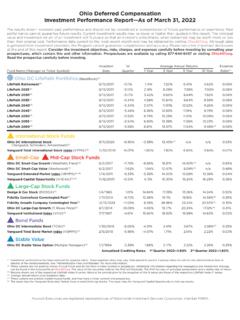Transcription of Industry Spotlight: Fintech
1 Industry spotlight : Fintech Crunchbase Industry spotlight : Fintech About Crunchbase. Crunchbase is the leading provider of private-company prospecting and research solutions. Over 55 million users including salespeople, entrepreneurs, investors, and market researchers use Crunchbase to prospect for new business opportunities. And companies all over the world rely on us to power their applications, making over 3 billion calls to our API. each year. What is Fintech ? Fintech is short-form for financial technology and includes everything from mobile banking technology to investment apps to cryptocurrency. As one of the most rapidly evolving sectors, Fintech has changed significantly since banking technology was first introduced in the 1860s. Since then, the invention of credit cards, e-trade and online banking has quickly progressed the Industry , threatening traditional financial institutions and changing the way people manage their finances.
2 Crunchbase Industry spotlight : Fintech 2. Why we cover Fintech . At Crunchbase, we are constantly analyzing our growing dataset and thinking about how to contextualize information to better equip people to make informed business decisions. Part of this process includes identifying trends and sharing complicated data insights in an easily digestible way, so you don't need advanced analytics tools or a data science degree to quickly identify and understand Industry developments. Fintech companies hold 16 percent of the spots on the Crunchbase Unicorn Leaderboard, collectively valued at close to $500 billion, per last known disclosed or reported valuations. Since 2010, investments in Fintech have grown more than ninefold, with $43 billion invested in 2019 alone. Crunchbase Industry spotlight : Fintech 3. Impact of COVID-19. With the impact of COVID-19 hundreds of millions of people are changing how they conduct their daily lives. Industries that rely on people gathering to provide a service have been disrupted in a short time frame.
3 Travel, events, restaurants, and retail businesses have been instantly impacted, casting a wider net on services that supply these businesses. Broad adoption of social distancing measures, along with shutdowns of businesses deemed non-essential, impacts a wide array of companies, including manufacturing, construction, logistics, and supply chain. Investors will be assessing their portfolio companies for risks to their businesses based on a very different consumer and business environment. Consumers will also rely on companies that connect us virtually. As with every sector, some will fare better than others. Companies that rely on the revenue of impacted industries will see shrinking markets. Those whose offerings address real needs in a challenging economy will see more attention. In financial services the underlying trends towards servicing newer market segments through online services are accelerated by these changes. The trend towards cashless economies is furthered, as businesses stop accepting cash in order to stem the transmission of the virus.
4 Loans are expected to increase, and mortgage refinancings are seeing unprecedented demand. According to Ryan Gilbert of Propel Venture Partners, Balance sheet businesses, specifically non-bank lenders are under tremendous pressure to collect on their issued loans and prove that their lending models can actually survive an economic shock like the one we are dealing with. The consumer and small business lending sectors seem to be hit the hardest.. Crunchbase Industry spotlight : Fintech 4. Companies providing benefits and services to independent workers become important in helping non-W2 workers stay covered during this health crisis. Services for the unemployed will become critical as society addresses those that are most in need of short and longer term support. Retail banks are shuttering their outlets on a short term basis. Will some of these short term closures become permanent as services move online? The full economic impact of COVID-19 is still too early to tell but a long- term recession or depression seems likely.
5 B2B companies will need to prepare for frozen sales pipeline for most of this year and longer sales cycles and shrinking budgets in 2021. B2C companies will need to adjust to reductions in consumer spending, greater emphasis on short term cash needs given spiking unemployment, and increased reluctance from consumers to switch financial service providers, said Satya Patel founder of seed investor Homebrew. The hardest hit Fintech businesses will be lending businesses that have large outstanding loan balances and that will have to deal with lots of uncertain credit risk. In general, an increasing emphasis on unit economics over growth, will put some companies in a very difficult fundraising position.. For this report we look at the last decade to provide a lens on the prevailing trends in Fintech . Crunchbase Industry spotlight : Fintech 5. Crunchbase Industry spotlight : Fintech Fintech has been a key arena for investment in the past decade with the rise of challenger banks, innovation in online payments, the changing market around lending and insurance, and the launch of cryptocurrencies.
6 With the impending recession, there will be companies that face a changed market opportunity and do not make it through. However, Fintech will continue to lead as a sector, as financial services become more deeply integrated into the consumer mobile experience--a bank in your pocket--along with the growth in services integrating financial products aimed at both consumers and businesses. The next 10 years are going to be more interesting to watch, with the growth of infrastructure and compliance as a service, allowing more players to enter this ecosystem. Alongside challenger banks in Europe, the , and now Latin America, 2,000 newly funded Fintech companies per year are chipping away at services provided by banks and other finance incumbents not limited to checking, transfers, loans, mortgages, brokerage, insurance, and more. Established public tech companies are building financial products into their services, with Google offering checking accounts (via Citigroup and small lender Stanford Federal Credit Union), Facebook launching Facebook Pay to facilitate payments across all its apps, and Apple launching Apple Card (developed by Goldman Sachs) that is linked to Apple Pay -- launched back in 2014.
7 In China, where credit card penetration is low, mobile payments represent 83 percent of all payments in 2018, up from just three percent in 2011 led by AliPay launched in 2004, and WeChat Pay in Crunchbase Industry spotlight : Fintech 6. 2013. The Chinese government is planning to launch its own state-backed cryptocurrency on the back of the Facebook Libra mislaunch. The most highly valued private company in the world is Ant Financial valued at $150 billion. As of February 2020, 90 companies on the Crunchbase Unicorn Leaderboard (16 percent) are in financial services, collectively valued at close to $500 billion. Fintech received 16 percent of global venture capital funding in 2019 and 17 percent in 2018, up from 10 percent in 2010. 2020 already exceeds 2019 in exits with the pending Visa acquisition of Plaid and Intuit acquisition of Credit Karma leading the way. Asia leads in payments, Europe in Neobanks, the in infrastructure, and LatAm in services for the unbanked.
8 Despite the downturn, we will continue to see multiple leading companies in Fintech across geographies. Fintech companies will reassess their product offerings in light of business and consumer needs in this changed funding environment. With this report, we dive into the last decade in Fintech funding and exits as we look to the next decade. I. Decade Of Venture Investments Into Financial Services II. Leading Sectors III. Growth In Leading Countries IV. Active Seed And Venture Investors V. Large Exits In 2019. VI. 90 Fintech Unicorns VII. Investor Predictions Crunchbase Industry spotlight : Fintech 7. I. Decade Of Venture Investments Into Financial In 2010 Fintech represented 10 percent of total venture funding. Fast forward to 2019, Fintech held 16 percent of total venture funding Crunchbase Industry spotlight : Fintech 8. Investments in Fintech companies have grown more than ninefold since 2010 and more than doubled since 2015. 2019 was the second highest investment year over the last decade with $43 billion invested in Fintech .
9 2018 is an all time high for investment in Fintech at $57 billion, with the largest growth percent year-over-year in late-stage venture. The largest funding round to a Fintech company was raised by Ant Financial -- a $14 billion Series C round in 2018. (The gap in funding between 2019. and 2018 decreases to $600 million if you remove Ant Financial's single Series C round from consideration.). Crunchbase Industry spotlight : Fintech 9. Financial services companies attracted a greater proportion of late-stage venture funding rounds in 2018 and 2019. Seed and early stage investments in Fintech were at 34 percent in 2019. and 32 percent in 2018. Seed and early stage venture represent a higher proportion of investment dollars, averaging 51 percent from 2010 to 2017. Crunchbase Industry spotlight : Fintech 10. Investments And Deal Count As of February 2020, year-over-year deal counts were down by 22 percent, but over time will lessen. Much of the difference in funding round counts are attributed to the seed stage -- down 31 percent -- where we see the most reporting delays.
10 At the early venture stage, counts are down by 10. percent. Late stage round counts are down by 5 percent. We fully expect these numbers to go up for 2019 relative to 2018, due to reporting delays. However, 2019 will not exceed 2018 a decade long peak for Fintech both in funding count and amount. (Reporting delays for funding amounts are less pronounced in Crunchbase data.). Crunchbase Industry spotlight : Fintech 11. II. Leading Industries: Lending, Banking, & Insurance Grow YoY. Leading financial services industries in 2019 included payments (along with mobile payments), insurance, banking, and lending, respectively. For many companies there is integration between these sectors; for example companies that offer payment and banking services or companies that offer banking and lending products. We assigned companies a single Industry for this analysis. Industries that grew year-over-year above 75 percent by invested dollars include lending and banking.







